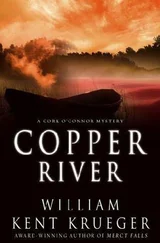William Krueger - Ordinary Grace
Здесь есть возможность читать онлайн «William Krueger - Ordinary Grace» весь текст электронной книги совершенно бесплатно (целиком полную версию без сокращений). В некоторых случаях можно слушать аудио, скачать через торрент в формате fb2 и присутствует краткое содержание. Жанр: Триллер, на английском языке. Описание произведения, (предисловие) а так же отзывы посетителей доступны на портале библиотеки ЛибКат.
- Название:Ordinary Grace
- Автор:
- Жанр:
- Год:неизвестен
- ISBN:нет данных
- Рейтинг книги:4 / 5. Голосов: 1
-
Избранное:Добавить в избранное
- Отзывы:
-
Ваша оценка:
- 80
- 1
- 2
- 3
- 4
- 5
Ordinary Grace: краткое содержание, описание и аннотация
Предлагаем к чтению аннотацию, описание, краткое содержание или предисловие (зависит от того, что написал сам автор книги «Ordinary Grace»). Если вы не нашли необходимую информацию о книге — напишите в комментариях, мы постараемся отыскать её.
Ordinary Grace — читать онлайн бесплатно полную книгу (весь текст) целиком
Ниже представлен текст книги, разбитый по страницам. Система сохранения места последней прочитанной страницы, позволяет с удобством читать онлайн бесплатно книгу «Ordinary Grace», без необходимости каждый раз заново искать на чём Вы остановились. Поставьте закладку, и сможете в любой момент перейти на страницу, на которой закончили чтение.
Интервал:
Закладка:
They came in great numbers, the people of Sioux County, to pay their respects. They came because they knew Ariel or they knew my father and mother or they knew us as a family. Jake and I stood mostly in a corner and watched as our parents received the public condolences person after person and were offered only the best of words about their daughter. My father as always was a pillar of respectfulness. My mother continued to be a hollow egg and it was painful to watch her and feel as if I was waiting for her to break. Liz stood with Jake and me and I appreciated her presence. After we’d been there for what seemed a very long time and yet there was still a very long time to go I said to Liz, “I need some fresh air.”
And Jake said quickly, “Me, too.”
“I think it would be all right,” Liz said.
“Would you tell Mom and Dad?”
“Of course. Don’t go far.”
We slipped from the room and out the front door and into the peach-colored evening sunlight that bathed New Bremen. The funeral home was a beautiful old structure that had once belonged to a man named Farrigut who’d very early on built a big cannery in the Minnesota River valley and had got rich. We drifted far away from the porch where those who came and went might notice us and feel obliged to say something. I didn’t feel like talking to anyone.
Jake reached down into the thick grass at the edge of van der Waal’s property and pulled up a four-leaf clover. He had an uncanny knack for spotting them. He idly plucked the leaves and said, “Think Mom’ll come home tonight?”
I was watching a couple of older people totter up the walk and slowly mount the funeral home steps and I was thinking it probably wouldn’t be long before one or the other or both would be lying in coffins inside and I said, “Who knows?”
Jake threw the denuded clover stem back into the grass. “Everything’s different.”
“I know.”
“I’m afraid sometimes.”
“Of what?”
“That Mom won’t come back. I mean she might come home but she won’t come back.”
I knew exactly what he meant.
“Come on,” I said. “Let’s take a walk.”
We left van der Waal’s and drifted down the street and took a left at the next corner and after another block came to Gleason Park where a dozen kids were playing baseball. Jake and I stood at the edge of left field and watched the game for a while. I knew a few of the players, kids younger than me, Jake’s age mostly. He probably knew them too and maybe they were kids who gave him a hard time for stuttering because he wasn’t paying much attention to the game. One of the kids, Marty Schoenfeldt, hit a double and slid into second and kicked up dust and Jake said, “I saw Mr. Redstone.”
“Redstone? Jesus! Where?”
The summer had done much to change us and Jake didn’t even flinch at the name I’d taken in vain.
“I dreamed him,” he said.
“Like a nightmare, you mean?”
“It wasn’t really a nightmare. Ariel was in it, too.”
I never dreamed about Ariel but she haunted my waking hours. Although we kept the door to her bedroom closed I sneaked in sometimes and just stood there. The smell that lingered most powerfully was the scent of Chanel No. 5, a perfume which she could never have afforded herself but was one of the gifts my grandfather and Liz gave her on her sixteenth birthday and which she dabbed on for special occasions. She’d worn it the night she disappeared. When I closed my eyes in her room and drew in the scent of her it was as if she’d never left us. Usually I ended up crying.
Warren Redstone was another matter. I often chased him in my nightmares, stumbling across the railroad trestle trying to tackle him before he escaped.
I said, “What were they doing in the dream?”
“Ariel was playing the piano. Mr. Redstone was dancing.”
“Who with?”
There was some sort of altercation between Marty Schoenfeldt and the kid who was playing second base. We watched for a few seconds, then Jake said, “Alone. They were in this big place like a ballroom. Ariel seemed happy but he didn’t. He kept looking behind him like maybe he was afraid somebody was sneaking up on him.”
Since that moment in the rain when I’d chosen to let the man who’d probably killed my sister get away I’d wanted desperately to tell someone what I’d done. It was a secret whose weight I carried every minute of every hour of every day and I longed to be free from it. Sometimes I thought that if I just confessed, the burden would be gone, and for a second I thought I would tell my brother because maybe if anyone could understand it would be Jake. But I didn’t. I kept the sin to myself and said bitterly, “I wish you’d dream him burning in hell.”
Marty Schoenfeldt shoved the second baseman and the players from both teams came running to gather around them. I watched what looked like a fight developing, the two kids taking stances.
“I talk to Ariel,” Jake said.
I looked away from the coming fight. “What do you mean?”
He shrugged. “It’s like praying only it’s not exactly. I just talk to her sometimes like she’s in the room and listening, like she used to, you know? I don’t know if she can hear me, but I feel better, like she’s not really gone.”
I wanted to say, She’s gone, Jake, she’s really gone, because that’s how I felt but I held my tongue and let Jake hold to his own imagining.
The kids pulled Marty Schoenfeldt and the second baseman apart and it looked like the game would resume. For some reason I felt an enormous sense of relief.
“Come on,” I said to Jake. “We better get back. They’ll be missing us.”
In the middle of the long dark of the night that followed, I woke to the brittle ring of the telephone. My father came from his bedroom and I got up too and stood in the doorway and watched him as he shuffled to the telephone in the upstairs hallway and answered. As he listened, I saw his face change and throw off all sleepiness and I heard him whisper, “Oh, dear God.” He shook his head in disbelief and then he said, “Thank you, Sheriff.”
He put the receiver in the telephone cradle and stood dumbstruck staring into the dark at the bottom of the stairs.
“What is it, Dad?”
His eyes swung slowly toward me and when he didn’t speak immediately I knew it was bad.
“Karl Brandt,” he finally said. “He’s dead.”
34
On Saturday afternoon we buried Ariel. The sky was nearly cloudless yet something heavy hung in the air over New Bremen and the valley of the Minnesota River. It was a hot day, another in a long line, and windless and I breathed the stale heat and felt the weight and could barely move.
By then I knew some of the details of Karl Brandt’s death. He’d been out in his beloved Triumph, driving back roads, the way he’d driven Jake and me on a day that seemed very long ago. He’d been going way too fast, had missed a turn, and had run into a big cottonwood tree. The impact had thrown him through the windshield and he’d died instantly. He’d been drinking from a bottle of his father’s scotch and there was no sign that he’d tried to make the turn in the road where the cottonwood stood. Whether the tragedy occurred because of the drink or the dark design of his own confused thinking no one could say.
Ariel’s funeral service was scheduled for two o’clock and was to be held in the Third Avenue Methodist Church across the street from our house. My father had requested that his district superintendent, Conrad Stephens, preside at both the full service at the church and the brief graveside ceremony after. He’d chosen music and made arrangements for Lorraine Griswold to be the organist and had asked Amelia Klement if she would lend her fine alto in leading the songs. He’d spoken with Florence Henne about arrangements for a meal after the burial for those who would be attending. He’d been through this dozens of times as a minister and knew exactly what he was doing although I’m certain that this time was quite different for him.
Читать дальшеИнтервал:
Закладка:
Похожие книги на «Ordinary Grace»
Представляем Вашему вниманию похожие книги на «Ordinary Grace» списком для выбора. Мы отобрали схожую по названию и смыслу литературу в надежде предоставить читателям больше вариантов отыскать новые, интересные, ещё непрочитанные произведения.
Обсуждение, отзывы о книге «Ordinary Grace» и просто собственные мнения читателей. Оставьте ваши комментарии, напишите, что Вы думаете о произведении, его смысле или главных героях. Укажите что конкретно понравилось, а что нет, и почему Вы так считаете.












